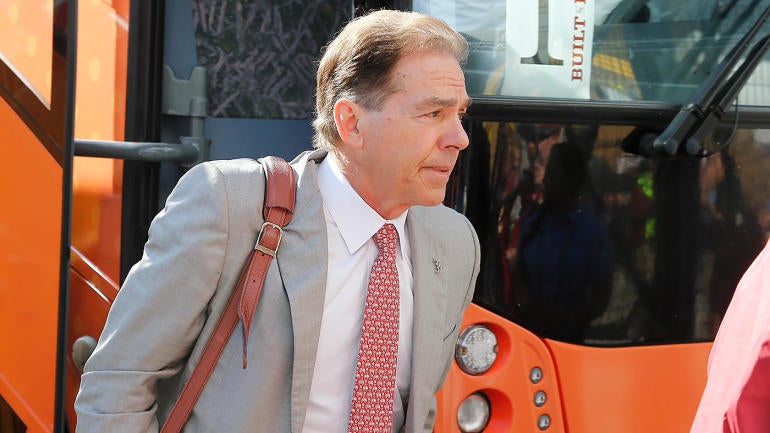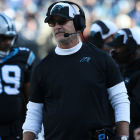
Recruiting is the life blood of college football programs, and while we focus on the few hat-picking five-stars, All-Americans and Heisman Trophy contenders, true success on Saturdays starts with years of work on the recruiting trail. Rounding out classes with talent that identifies team needs and repeating that process over multiple cycles builds a roster with what coaches like to call competitive depth. When injuries and attrition hit, those teams that have had the most success on the recruiting trail are better prepared to endure those roster setbacks.
Now that National Signing Day -- both the Early Signing Period and February's traditional signing date -- is in the books for the 2020 cycle, it's time to take a look at which programs have done the best job stacking multiple highly ranked classes together in the pursuit of conference and national championships.
These rankings are not a pure reflection of the talent on the roster. Our partners at 247Sports offer the Total Team Composite each August which takes transfers, NFL Draft exits and other attrition into consideration to produce a talent score based on the prospects on the roster for the upcoming season. This analysis focuses exclusively on the player acquisition portion of program building, using five years of data from the 247Sports Composite Rankings to identify some trends on the recruiting trail.
The top of the rankings come as no surprise, with Alabama and Georgia as the only schools averaging a top-three class over the past five years. With two No. 1 classes in the past three years, the Bulldogs have closed the gap with the Tide on the recruiting trail created by Nick Saban's run of consecutive No. 1 classes at the start and through the middle of the decade. Ohio State and LSU occupy a firm second tier of elite recruiting, followed by a much more crowded third tier that has a surging Clemson at the front and a falling Florida State on the back end, with plenty of familiar faces from the SEC, Big Ten and Big 12 in between.
We've collected all the data that you can view in the table below, and then we'll spotlight a few programs that have stood out among the top 25 recruiting programs in the country.
| Team | Conference | Five-Year Average | 2016 | 2017 | 2018 | 2019 | 2020 |
|---|---|---|---|---|---|---|---|
Alabama | SEC | 2.4 | 1 | 1 | 7 | 1 | 2 |
Georgia | SEC | 2.8 | 7 | 3 | 1 | 2 | 1 |
Ohio State | Big Ten | 5.4 | 4 | 2 | 2 | 14 | 5 |
LSU | SEC | 6.8 | 3 | 7 | 15 | 5 | 4 |
Clemson | ACC | 9 | 10 | 16 | 6 | 10 | 3 |
SEC | 9.6 | 9 | 9 | 12 | 11 | 7 | |
Big 12 | 10.4 | 11 | 26 | 3 | 3 | 9 | |
Big Ten | 10.6 | 5 | 5 | 21 | 8 | 14 | |
SEC | 10.8 | 13 | 10 | 14 | 9 | 8 | |
Big 12 | 11 | 21 | 8 | 9 | 6 | 11 | |
SEC | 11.6 | 19 | 12 | 17 | 4 | 6 | |
Florida State | ACC | 11.6 | 2 | 6 | 11 | 17 | 22 |
Big Ten | 13.6 | 20 | 15 | 5 | 13 | 15 | |
Independent | 13.6 | 15 | 11 | 10 | 15 | 17 | |
SEC | 14.6 | 14 | 17 | 20 | 12 | 10 | |
Pac-12 | 16.4 | 28 | 19 | 16 | 7 | 12 | |
Miami | ACC | 16.8 | 22 | 13 | 8 | 28 | 13 |
Pac-12 | 18.2 | 8 | 4 | 4 | 20 | 55 | |
Pac-12 | 19.2 | 29 | 22 | 13 | 16 | 16 | |
SEC | 20.4 | 26 | 21 | 19 | 18 | 18 | |
Big Ten | 21.6 | 24 | 23 | 22 | 19 | 20 | |
Pac-12 | 22.2 | 16 | 14 | 39 | 21 | 21 | |
Pac-12 | 25.2 | 12 | 20 | 18 | 44 | 32 | |
SEC | 25.6 | 6 | 30 | 31 | 22 | 39 | |
SEC | 26.6 | 31 | 24 | 27 | 24 | 27 |
Signing day rankings are not the end-all be-all for college football success, but they still say a lot about the health of a program and the battles that are being won or lost on the recruiting trail. With that in mind, here are a few teams trending in both the right and wrong directions over the past three-to-five years.
Trending up
Clemson: Some programs see their surging success on the recruiting trail first, then the on-field payoff comes later. Clemson's rise is even more concerning for its foes in the ACC and across the country because it has worked in the opposite direction for the Tigers. Dabo Swinney and his staff started the decade celebrating a few key four-star prospects that helped round out top-20 classes on National Signing Day. After winning two national championships across five consecutive College Football Playoff appearances, they're pulling in five-stars from all across the country and getting many of them signed during the Early Signing Period with opportunities to enroll early. We saw Clemson become one of the winningest programs of the CFP era with top-15 to top-10 talent, and the trends are pointing to the Tigers only getting better in the years to come.
Texas: There have been some frustrating setbacks for Tom Herman on the field since he arrived in Austin, but his impact on the recruiting trail has reversed what had become a troubling trend for one of the nation's blue blood college football programs. Back-to-back top-three classes in the 2018 and 2019 cycles were followed by a top-10 finish in 2020 after seeing the program slide into the mid-teens in the rankings from 2013-17. If you're looking for reasons to get excited about the Longhorns in 2020, consider that some key players from those top-three classes are now going to be the leaders in Austin as Herman tries to engineer a return to the Big 12 Championship Game.
Oregon: The Pac-12 recruiting landscape has shifted several times already in the first two decades of the 2000s, including the rise of Oregon as one of the conference's top places for talent, a dip down in the recruiting rankings under Mark Helfrich and now an upward trajectory with Mario Cristobal at the helm. The Ducks followed up last year's No. 7-ranked class with a group that ranked No. 12 in 2020, giving them the highest five-year class ranking average in the conference.
Trending down
USC: We could see these five-year rankings and the Trojans' place among their peers as an example of small sample size theater. The 2020 recruiting cycle saw USC rank No. 55, pulling its five-year average down to 18.2. The Trojans had a top-10 class every year from 2014-18, including back-to-back top-five classes included in this average, but this year's recruiting ranking setback followed last year's drop-off from No. 4 to No. 20 to establish a downward trend on the trail. Anyone who has closely followed the ups and downs of the Clay Helton era at USC should not be surprised by the direction, but the drastic nature of the drop-off is alarming even to experts. Never in the 247Sports Composite era have I had to click "Load More" to access teams outside the top 50 to find USC.
Florida State: As we mentioned in the intro, the Seminoles are holding on in top half of these rankings with a five-year class average of 11.6. The concern, for trajectory purposes, lies with three straight years of rankings that are right at or below the five-year average. Mike Norvell got some key NFL Draft-eligible players back in the fold for a fourth year that will help keep the talent level high on the field in 2020, but the drive to sign an elite class in 2021 is going to be a key concern for the staff after three straight years of declining recruiting rankings.
Ole Miss: Lane Kiffin is leading the Rebels into a new era, but the roster he inherited is going to need some upgrades to reclaim the kind of on-field success that Hugh Freeze achieved in 2014 and 2015. NCAA sanctions and other lingering effects from the Freeze scandal hurt Ole Miss on the recruiting trail, and the results have included classes outside the top 25 in three out of the past four years. Kiffin worked to keep the 2020 class together but finished with a group that ranked No. 39 nationally, so like Norvell and many other first-year coaches, he's entering a 2021 cycle that could be a turning point in the early part of his tenure.
![[object Object] Logo](https://sportshub.cbsistatic.com/i/2020/04/22/e9ceb731-8b3f-4c60-98fe-090ab66a2997/screen-shot-2020-04-22-at-11-04-56-am.png)

















